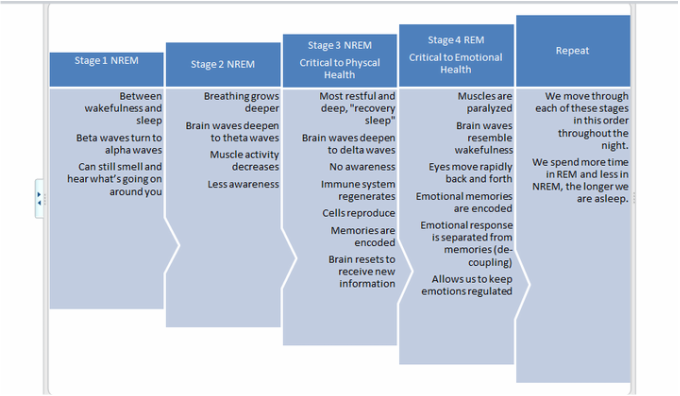|
Sleep is so important that almost every single diagnosis in the Diagnostic and Statistical Manual for Mental Health Disorders (or DSM) has a disrupted sleep component to it. That's why I ask every client about sleep on the initial paperwork when entering counseling. I have conversations about sleep so frequently in counseling sessions, I decided I needed to gain more information and new ways to explain what happens while we are sleeping. There happened to be a great article about this topic in the November issue Counseling Today, a periodical published by the American Counseling Association. It turns out there are two critical periods to your sleep cycle. The Stage 3 NREM phase is crucial for physical health. Your immune system and cells regenerate. It's called recovery sleep. The system in the brain which creates the stress response (the hypothalamic-pituitary-adrenal axis and the sympathetic nervous system) is powered down. We spend the most time in this kind of sleep and it seems to be akin to recharging our batteries. The Stage 4 REM sleep phase enhances our emotional health, allowing us to keep our feelings in check so that we can function in our day. Emotional memories are encoded during this phase and are separated from the actual emotional response, allowing us to retrieve these memories from a distance and not get so overwhelmed in them again, as if they were happening all over. People with trauma histories have a particularly disrupted Stages 3 NREM and 4 REM cycles, resulting in the inability to process memories and deactivate the stress response. See the below graphic for more details about all the stages of sleep. For more on sleep hygiene and an excellent sleep diary, visit the National Sleep Foundation. You can improve your sleep by avoiding caffeine, alcohol, and heavy meals in 2-3 hours leading up to bedtime. It also helps to have a bedtime ritual at the same time every day, engaging in an activity like reading, relaxation exercises, gentle stretches or drinking herbal tea in the hour before bedtime. And exercise in the early afternoon seems to have a positive effect on sleep quality.
Here's to a restful night's sleep! Contact us and learn more about how counseling can help you learn self-care skills like good sleep hygiene. Comments are closed.
|
AuthorKambria Kennedy-Dominguez, LPC-S |
Phone: 972.755.9120 | Fax: 214.723.5345
533 W. 12th Street Dallas, TX 75208
Privacy Policy Good Faith Estimate
©Flourish Counseling and Consultation PLLC 2024
533 W. 12th Street Dallas, TX 75208
Privacy Policy Good Faith Estimate
©Flourish Counseling and Consultation PLLC 2024


 RSS Feed
RSS Feed
